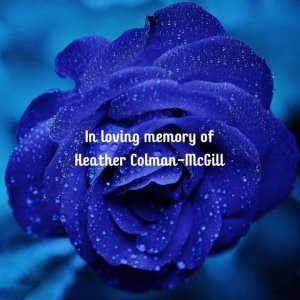Our dear community,
Let us take a moment to gather together and comfort one another. We are saddened to bring you news of a death in the community. Heather Colman-McGill has passed away. We send our heartfelt condolences to all of Heather’s loved ones. We know that many in our community had reached out to Heather and that she felt your love during a very difficult time. We share a lovely tribute from two of her friends Amber Ella and Christina Steiger below.
Please feel free to share your memories of Heather or how you take time to honor those we have lost in the community in the comments. Perhaps you light a candle or say prayer. Maybe you take a moment to look into the sky and speak their name. This might be when you once again dig deep and commit to continue fighting for a better world for people with ME. Reach out to another member of the community to say, “I value you!”
Find Support
However you grieve is right. If you need to reach out to find support at this time we have support groups available as well as resources if you find yourself in crisis and needing to talk to a professional. You can find those listed here.
Remembering Heather
From the celebration of life shared by Amber and Christina:
 Heather Colman-McGill, a vibrant environmental scientist, friend, daughter, sister, partner, advocate, and activist has died after fighting for her life for years with very severe myalgic encephalomyelitis (ME).
Heather Colman-McGill, a vibrant environmental scientist, friend, daughter, sister, partner, advocate, and activist has died after fighting for her life for years with very severe myalgic encephalomyelitis (ME).
Before ME, Heather led an active life as an environmental scientist, athlete, and world traveler. She had a deep love of nature and the environment and a tremendous zest for life. Before falling ill, she took every opportunity to be outside and enjoy the natural world. She loved all life on this beautiful planet and was a staunch advocate for biodiversity.
Heather first developed ME as a teenager, though like many patients, she was not diagnosed for nearly 20 years. In her case, she was infected by a tick-borne disease at 12 and mononucleosis at 18 and was exposed to toxic mold in her childhood homes and schools. She began having many symptoms of the illness, but when doctors had no answers, she simply pushed through until that was no longer possible.
Despite declining health, Heather managed to earn a BA in Biology at Bowdoin and a Masters in Environmental Management at Yale. Heather hoped for an exciting career working as an environmental science and policy expert. In her last position, she worked as a UN consultant on biodiversity loss, protected area management, and climate change. Despite her illness, she remained passionate about environmental policy. She wanted nothing more than to step back into her life and career. It was with great pain that she could not be on the front lines of the fight against climate change, yet she still found ways of raising awareness, even as her health continued to fail.
 Now, at age 38, Heather is gone.
Now, at age 38, Heather is gone.
The world of severe ME is unimaginable to most. She could rarely experience the outdoors on her “good days” if carried out in a wheelchair in a reclining position, as even sitting up briefly was too much for her fragile condition. Even something as simple as a moment of hearing a bird sing could lift her spirits for days. As ME is “invisible”, she sometimes looked ok despite suffering immensely from severe flu-like exhaustion, body-wide muscle and joint pain, stiff neck, unstable blood pressure and heart rate, muscle twitches and spasms, chronic lightheadedness, sound/vibration sensitivity, nausea, food intolerances, and extreme thirst, among other symptoms. She was often unable to speak, and only had a brief period on “good” days when she had the cognitive energy to focus, which she devoted to environmental advocacy as well as researching and planning her own path to recovery.
Eventually, her condition worsened to a state where she could no longer enjoy these tiny slivers of light that are so rare in severe ME.
Despite her suffering, Heather maintained solid hope for a full and active future and worked to spread awareness about this unimaginably debilitating, yet widely misunderstood and underfunded, neuroimmune disease.
Those with severe ME are largely rejected by the medical community, leaving extremely ill patients even more vulnerable. Those who are most in need of medical care and caregiving support often do not have it.
Despite her circumstances, she deeply appreciated the ordinary things in life that are so easy to take for granted. Ultimately, these moments were not enough to sustain her through the dark and challenging times of having severe ME.
Heather had a close-knit circle of friends and family who loved and advocated for her. It was with great sadness that she could not spend more time with her loved ones, especially her nephew. We have lost a beautiful soul and friend.
Please help honor Heather’s memory by being a tireless advocate for those who have severe ME and who have been rejected or forgotten by medicine. You have not been forgotten by the ME community. Never has there been more hope on the horizon.
Heather posted the following poem on her Facebook page a while back. Be free, star traveler. – with Christina Steiger
when I die,
my atoms come undone;
i will be space dust, once again.
the wind will carry me;
scatter me everywhere;
like dandelions in springtime.
i’ll visit worlds and alien moons;
it will be so damn poetic –
until I land on your sandwich.





6 thoughts on “We Remember and Honor the Life of Heather Colman-McGill ”
I’m so moved to read about Heather. She sounds like an amazing, courageous person. My love to everyone who’s grieving. Thank you too for sharing the poem, which made me both laugh and cry.
Once M.E. has risen to the ‘severe’ level, the patient loses all ability to make and go to doctors, specialists, be involved with current studies on ME/CFS, etc. It is easy to lose hope at this point because no one knows of your situation except family, who are exhausted themselves from just being your caregiver. Cognitive loss keeps the severe ME/CFS patient from being able to follow along with books, audio, or television. Physical, personal, Spiritual and learning all slow down. Then stop.
Heather is in my heart and prayers as I know exactly the path she traveled.
Yet another oh so promising life cut short!
Tragic beyond belief.
Thanks for sharing Heather’s story.
I’m truly sorry for the loss of Heather, and send condolences to all who loved her. M.E. *MUST* be brought to the forefront of medicine. Many are out there fighting for that.
my condolences to Heather’s family and friends ,and to those who knew and cared for her.i never knew Heather but as a severe ME fellow sufferer ,i feel deep respect for her brave fight against ME and also
deep sadness that we have lost another shining light.
I’m very, very sorry to hear about Heather’s passing, but I have a question, because I see a pattern in all of the deaths, including Heather’s, that perhaps we could learn from.
Why is it that we keep on pushing and pushing and pushing, even AFTER we’re severely ill? Why don’t we listen to our bodies and stop and rest?
Comments are closed.